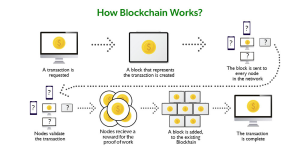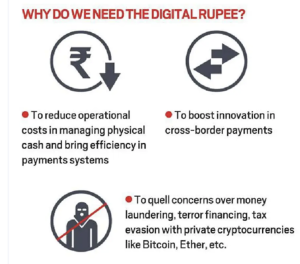Prelims – 30th Nov 23
Digital Rupee
What is Cryptocurrency?
Cryptocurrency is decentralized money, free from any government or central bank’s chains. It relies on blockchain technology and uses cryptography to secure transactions done by people making it impossible to counterfeit.
Crypto-currency is based on 3 concepts: Block Chain, Decentralized and Cryptography.
- Blockchain: Electronic ledger which distributed across entire network.
- Decentralisation: In cryptocurrency it means that the asset is free from governing bodies like central banks.
- Cryptography: It means secret writing i.e.; the recipient can only read messages. In the blockchain, each block contains its own block hash and a hash of its previous block. Which helps them to form a cryptographically secured linear chain of blocks.

Central Bank Digital Currency
- Last year RBI launched e-rupee which is a digital currency.
- Officially it is known as Central Bank Digital Currency (CBDC).
- The digital rupee is the RBI’s accepted version of cryptocurrencies. Being an electronic form of sovereign currency, the CDBC is being touted as safer than private cryptocurrencies.
- It is the same as the fiat currency, and is exchangeable one-to-one with the fiat currency. Only its form is different — it is not paper (or polymer) like physical cash.
- It is a fungible legal tender, for which holders need not have a bank account. CBDC will appear as ‘liability’ (currency in circulation) on the RBI’s balance sheet.
Fintech in India
Need
- There is a diverse range of virtual currencies being circulated and the market currently is extremely fragmented. Due to their limited scale and efficiency, the number of transactions occurring through private virtual currencies is very low.
- Penetration of private digital currencies remains low which offers a strong case for India’s own digital fiat rupee that will promote financial inclusion and increase demand for real money balances.
- India’s high currency-to-GDP ratio (>13%) holds out another benefit of CBDCs that can replace large cash transactions and reduce the costs that the central bank bears for printing, transporting, and managing cash.
Benefits of CBDC

- Easing the cross border transactions.
- Currency handling cost.
- Financial Inclusion.
CBDC vs Cryptocurrency
- CBDC is backed by RBI, cryptocurrencies are not.
- CBDC is claim on RBI, cryptocurrencies are not.
Benefits of CBDC
- When CBDC is transacted instead of bank balances, the need for interbank settlement disappears.
- CBDC can also enable a more real-time and cost-effective globalization of payment systems.
CBDC vs UPI
- The biggest difference between e Rupi and UPI is that, e Rupi itself is a currency in digital form enabling digital transactions, whereas UPI is a platform through which transactions happen digitally.
- The bank acts as an intermediary in every UPI transaction. In CBDC bank does not route payments or act as a middleman.
- Another intrinsic property of the CBDC is its anonymity, similar to the case of physical cash. However, the intermediaries (banks) have the data in UPI transactions.
Concerns Associated with e-Rupee
- Security.
- Anonymity: How RBI will maintain anonymity: whenever money transfers happen online, details like their internet protocol (IP) address details are saved with intermediaries. In the case of the e-rupee, the intermediary is the RBI.
- Low digital literacy.
- Lack of trust on digital transactions.
Challenges with Cryptocurrency
- A committee of International Financial Reporting Standards Foundations (IFRS) Foundation pointed out cryptocurrency cannot be treated as financial assets as cryptocurrencies is neither cash nor equity instrument.
- There is no central agent to regulate or stabilize the value of currency.
- The transactions are slow, costly, non-scalable, and the process is far from simple.
- E.g., for Ethereum, one of the leading cryptocurrencies, the average productivity of validators is 15.5 transactions per day and per validator. This is against UPI that processed 136 million transactions per day in October 2021 alone.
GAVI, the Vaccine Alliance
GAVI, or the Global Alliance for Vaccines and Immunization, is a public-private global health partnership dedicated to increasing access to immunization in developing countries. GAVI was established in the year 2000 with the goal of improving global vaccination coverage, preventing the spread of infectious diseases, and ultimately saving lives.
Recently, Serum Institute of India has received funds from Gavi, the Vaccine Alliance and the Bill and Melinda Gates Foundation, that would allow it to double its supply of COVID-19 vaccines (200 million doses) to India and other poorer countries as part of the Gavi COVAX facility. The vaccines will be priced at a maximum of USD 3 per dose.
- SII (Pune), the world’s largest vaccine manufacturer by volume, has agreements to manufacture Covid-19 vaccines, Covidshield (under clinical trials) developed by American vaccine maker Novavax, as well as Oxford University in collaboration with Swedish-British drugmaker AstraZeneca
- Core partners of GAVI include the WHO, UNICEF, the World Bank and the Bill & Melinda Gates Foundation.
- In June 2019, the Gavi Board approved a new five-year strategy (‘Gavi 5.0’) with a vision to ‘leave no-one behind with immunisation’ and a mission to save lives and protect people’s health by increasing equitable and sustainable use of vaccines.
Coalition for Epidemic Preparedness Innovations
- CEPI is a global partnership launched in 2017 to develop vaccines to stop future epidemics.
- CEPI was founded in Davos (Switzerland) by the governments of Norway and India, the Bill & Melinda Gates Foundation, the Wellcome Trust, and the World Economic Forum.
India is a Gavi beneficiary and will, therefore, receive a certain proportion of the vaccines from the COVAX facility
AUKUS
AUKUS stands for “Australia, United Kingdom, United States Security Partnership.” It is a trilateral security alliance announced in September 2021 between Australia, the United Kingdom, and the United States. The primary focus of AUKUS is to enhance cooperation in the Indo-Pacific region, with a particular emphasis on strengthening defense and security capabilities. One of the key elements of this partnership is the development of nuclear-powered submarines for the Royal Australian Navy, a move that has geopolitical implications and has drawn attention in the context of regional security dynamics
As part of the AUKUS initiative with Australia and the US, the UK has given three UK businesses a 4 billion pound ($4.9 billion) contract to design and build an attack submarine powered by nuclear energy.
About AUKUS
- Established in 2021, the AUKUS is intended to be a strategic partnership among Australia, the United Kingdom (UK), and the United States to bolster their allied deterrence and defense capabilities in the Indo-Pacific.
- The trilateral partnership, which builds on their decades-long security cooperation, has two pillars.
- Pillar I revolves around the acquisition and development of conventionally armed nuclear-powered submarines for the Royal Australian Navy;
- Pillar II calls for collaboration on advanced capabilities that will involve technology and information sharing;
- The submarine component?
- It is designed to equip Australia with nuclear-powered attack submarines (SSNs).
- In total, Australia will end up with eight of the new nuclear submarines, called SSN-AUKUS.
- Those submarines will be based on a British design but have American technology or an American combat system.
- The deal marks the first time the US has shared nuclear propulsion technology with an ally other than the UK.
- It will significantly enhance Australia’s undersea capabilities in the Indo-Pacific.
- These countries, however, made it clear that their aim is not to arm the new submarines with nuclear weapons. This is because Australia is a signatory to the Nuclear Non-proliferation Treaty (NPT), which bans it from acquiring or deploying nuclear weapons.
